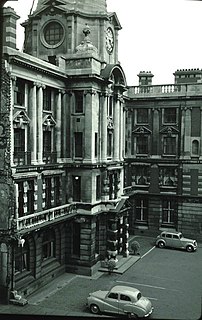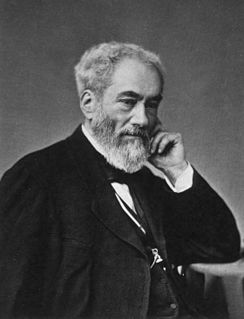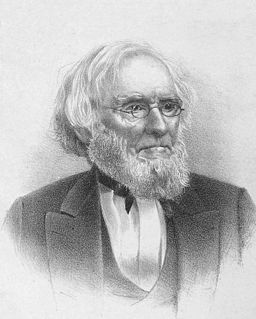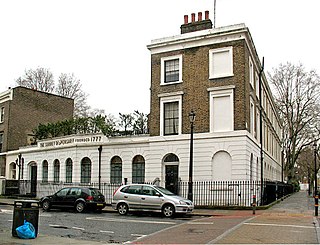Related Research Articles

John Abercrombie was a Scottish physician, author, philosopher and philanthropist. His Edinburgh practice became one of the most successful medical practices in Scotland. The Chambers Biographical Dictionary says of him that after James Gregory's death, he was "recognized as the first consulting physician in Scotland". As surgeon to The Royal Public Dispensary and the New Town Dispensary he provided free medical care for the poor of the town and taught medical students and apprentices. He published extensively on medical topics and latterly on metaphysics morality and religion. A devout Christian he gave financial support to missionary work. Abercrombie was awarded the honorary degree of MD from the University of Oxford, was elected Rector of Marischal College and University, Aberdeen and appointed Physician to the King in Scotland.

Manchester Royal Infirmary is a hospital in Manchester, England, founded by Charles White in 1752. It is now part of Manchester University NHS Foundation Trust, sharing buildings and facilities with several other hospitals.
The London School of Medicine for Women (LSMW) established in 1874 was the first medical school in Britain to train women as doctors. The patrons, vice-presidents, and members of the committee that supported and helped found the London School of Medicine for Women wanted to provide educated women with the necessary facilities for learning and practicing midwifery and other branches of medicine while also promoting their future employment in the fields of midwifery and other fields of treatment for women and children.

The Public Dispensary of Edinburgh was the first free-of-charge hospital in Scotland.

The Ancoats Hospital and Ardwick and Ancoats Dispensary was a large inner-city hospital located in Ancoats, to the north of the city centre of Manchester, England. It was built in 1875, replacing the Ardwick and Ancoats Dispensary that had existed since 1828. The building is now Grade II listed.

The Elizabeth Garrett Anderson and Obstetric Hospital and its predecessor organisations provided health care to women in central London from the mid-Victorian era. It was named after Elizabeth Garrett Anderson, one of Britain's first female physicians, and its work continues in the modern Elizabeth Garrett Anderson wing of University College Hospital, part of UCLH NHS Foundation Trust.

A public dispensary, charitable dispensary or free dispensary gives advice and medicines free-of-charge, or for a small charge.

Robley Dunglison was an English-American physician, medical educator and author who served as the first full-time professor of medicine in the United States at the newly founded University of Virginia from 1824 to 1833. He authored multiple medical textbooks and is considered the "Father of American Physiology" after the publication of his landmark textbook Human Physiology in 1832. He was the personal physician to Thomas Jefferson, James Madison and James Monroe. He consulted in the treatment of Andrew Jackson and was in attendance at Jefferson's death.

A hospital is a health care institution providing patient treatment with specialized health science and auxiliary healthcare staff and medical equipment. The best-known type of hospital is the general hospital, which typically has an emergency department to treat urgent health problems ranging from fire and accident victims to a sudden illness. A district hospital typically is the major health care facility in its region, with many beds for intensive care and additional beds for patients who need long-term care. Specialized hospitals include trauma centers, rehabilitation hospitals, children's hospitals, seniors' (geriatric) hospitals, and hospitals for dealing with specific medical needs such as psychiatric treatment and certain disease categories. Specialized hospitals can help reduce health care costs compared to general hospitals. Hospitals are classified as general, specialty, or government depending on the sources of income received.

The Boston Dispensary (est.1796) or Boston Medical Dispensary provided for "medical relief of the poor" in Boston, Massachusetts, from the late 18th century through the mid-20th century. It was one of the first hospitals in the United States. In the 1960s the Boston Dispensary merged with New England Medical Center and is now known as Tufts Medical Center.

Edward Delafield was an American physician, primarily known as an ophthamologist, but also for his work in obstetrics and gynaecology. He was the co-founder of the New York Eye Infirmary and the first president of the American Ophthalmological Society. From 1858 until his death he was the president of the College of Physicians and Surgeons in New York City. His son, Francis Delafield, also became a prominent physician.

Sir James Risdon Bennett was an English physician.
David Uwins was an English physician and medical writer.

The Surrey Dispensary was founded in 1777 to administer advice and medicine to the poor of the Borough of Southwark and places adjacent. It was once one of the largest dispensaries in south London.

Rose v Royal College of Physicians, also known as The Rose Case, was a 1703 British landmark court case between the Royal College of Physicians (RCP) and William Rose, a Liveryman of the Society of Apothecaries. Rose had treated a John Seale, who complained about his treatment to the RCP, who brought a successful court action against Rose in 1703. The Society of Apothecaries and Rose successfully appealed against this judgement. However, this did not change medical practice but merely legitimised what apothecaries were doing already and confirmed the "status quo". It did, nevertheless, symbolize the decline in the College's growing legal monopoly over who practises medicine. The case was ultimately seen as not one between a College and one individual, but one between one powerful College against one powerful Society.

The Warwick Lane dispensary, also known as the London Dispensary for the Sick Poor, was a dispensary planned by the Royal College of Physicians in 1688 and opened in 1698 within the College's laboratory in Warwick Lane. Medical advice and medications were given free of charge to the poor. Following the Rose case and opposition from apothecaries, it eventually closed in 1725.

The General Dispensary, Aldersgate Street, was a London dispensary which provided outpatient treatment and home-visiting for sick adults and children.
Extramural medical education in Edinburgh began over 200 years before the university medical faculty was founded in 1726 and extramural teaching continued thereafter for a further 200 years. Extramural is academic education which is conducted outwith a university. In the early 16th century it was under the auspices of the Incorporation of Surgeons of Edinburgh (RCSEd) and continued after the Faculty of Medicine was established by the University of Edinburgh in 1726. Throughout the late 18th and 19th centuries the demand for extramural medical teaching increased as Edinburgh's reputation as a centre for medical education grew. Instruction was carried out by individual teachers, by groups of teachers and, by the end of the 19th century, by private medical schools in the city. Together these comprised the Edinburgh Extramural School of Medicine. From 1896 many of the schools were incorporated into the Medical School of the Royal Colleges of Edinburgh under the aegis of the RCSEd and the Royal College of Physicians of Edinburgh (RCPE) and based at Surgeons' Hall. Extramural undergraduate medical education in Edinburgh stopped in 1948 with the closure of the Royal Colleges' Medical School following the Goodenough Report which recommended that all undergraduate medical education in the UK should be carried oy by universities.

Samuel Powel Griffitts was an American physician, widely regarded as the founder, in 1786, of the Philadelphia Dispensary. He was an early member of the American Philosophical Society, elected in 1785.
References
- ↑ Plan of the Finsbury Dispensary for Administering Advice and Medicines to the Poor. 1788. Retrieved 5 December 2017.
- ↑ Samuel J. Rogal, John Wesley's London: a guidebook, p.104, Edwin Mellen Press, 1988 ISBN 0-88946-823-0
- ↑ Samuel Lewis, A topographical dictionary of England, S. Lewis & Co., London, 1840.
- ↑ Roger M Ridley-Smith, "The Finsbury Dispensary" Archived 2016-02-09 at the Wayback Machine , New Zealand Medical Journal, vol.119, no.1233, 5 May 2006, archived 15 April 2016.